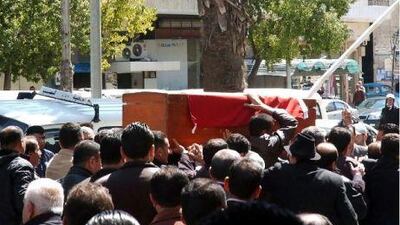DAMASCUS // Syria edged closer to its first meaningful political reform in decades yesterday with promises from the office of Syrian President Bashar al Assad that repressive emergency laws would be lifted.
But as of last night no conclusive action was made to revoke martial rule and restore basic civil rights to the population, and in the meantime Mr al Assad's military were taking up positions in the coastal city of Latakia, the scene of violence in recent days and a city that may prove a fulcrum for fears of sectarian bloodshed in the country.
Bouthaina Shaaban, a senior adviser to Mr al Assad, said yesterday the decision to end a state of emergency that has endured for 48 years had "already been made".
While that statement went further than a previous pledge given last Thursday to "study" lifting the law, Ms Shaaban said she had "no information" as to when the draconian legislation would actually be lifted,
There was further speculation that parliament would "soon" be notified of plans to suspend martial rule, perhaps within a matter of hours.
But the caveats about timing meant the political changes that civil-rights activists and many ordinary Syrians hope to see remained out of reach last night.
"Saying the law will be lifted without actually lifting it doesn't count for anything, it sounds like they are playing for time," said one Syrian analyst in Damascus, on condition of anonymity. "Reform is not reform until it has happened - up until then it's just more words."
Ms Shaaban's remark about the emergency laws, made to at least two news organisations, was the latest in a number of mixed signals about how the authorities intend to deal with a growing political crisis.
Although in Damascus there was talk of ending martial law "within hours" - and even premature celebrations, with some political activists believing the state of emergency had ended - army units were taking up positions in Latakia in a move the government said would halt the bloodshed there.
At least 10 people have died in Latakia in the past three days, although exact details of the violence in the city are unclear.
The authorities yesterday said that 10 people had been killed and more than 200 wounded in clashes between an "armed gang" and the security services.
Civil-rights activists said protesters had been killed by security units, but there were also reports from human rights monitors that police officers had been killed.
The situation in Latakia is particularly sensitive because the population is primarily a mix of Sunni Muslims and Allawites, the minority Shiite sect that controls the Syrian establishment and dominates the armed forces.
Some reports from the city suggested attempts were under way to incite a sectarian conflict, with each community receiving warnings that it was about to be attacked by the other.
The spectre of a sectarian conflict breaking out has been used by the authorities for years as a justification for their heavy-handed rule, with officials arguing that the regime is all that stands between the country and the kind of bloody chaos that has devastated neighbouring Iraq and Lebanon. Ms Shaaban said outside forces were trying to stir up sectarian strife inside Syria.
One political activist who has been supporting the demonstrations said: "We expected the government to play the sectarian card. It's a sign of the regime's desperation. Usually they try to make people forget about Hama, but when they start to remind people about it, it shows they are afraid."
In 1982, the old city of Hama, north of Damascus, was razed by forces loyal to the former president, Hafez al Assad - the current president's father - in the suppression of a violent uprising by Islamist militants. Thousands of people, civilians and militants alike, died in the carnage.
That bloody event casts a long shadow over Syria, and with the outbreak of unrest in recent weeks it has never been far from people's minds.
The actions of security forces in the southern city of Deraa last week, when dozens of civilians were shot and killed after the city was sealed off by the military, have only underlined that the authorities are not afraid to use deadly force against their opponents.
While the destruction of Hama in the 1980s put an end to that insurgency, the anti-government protests of today were not extinguished by the bloodshed in Deraa. On the contrary, demonstrations have escalated and spread to towns and cities across Syria and have pushed the government, which insists it is open to reform, towards meeting some of the protesters' demands.
Those include releasing political prisoners (there are believed to be thousands held in the country's jails) and scrapping emergency laws.
In some areas of the country, protesters have gone beyond that, and are now calling for regime change, in part because of the outrage caused by the killings in Deraa and elsewhere.
Scores of civilians have been shot and killed by security forces. But the silent majority, which has not turned out for protests or pro-government rallies, seems to still be supportive of Mr Assad and hopeful that, with some decisive reforms, he will be able to steer the country to safety.
Until little more than two weeks ago it had seemed that Syria would be bypassed by the political tumult shaking the Middle East. But a series of small protests and a heavy-handed response to local grievances in Deraa have brought Syria firmly into the storm engulfing the region.

